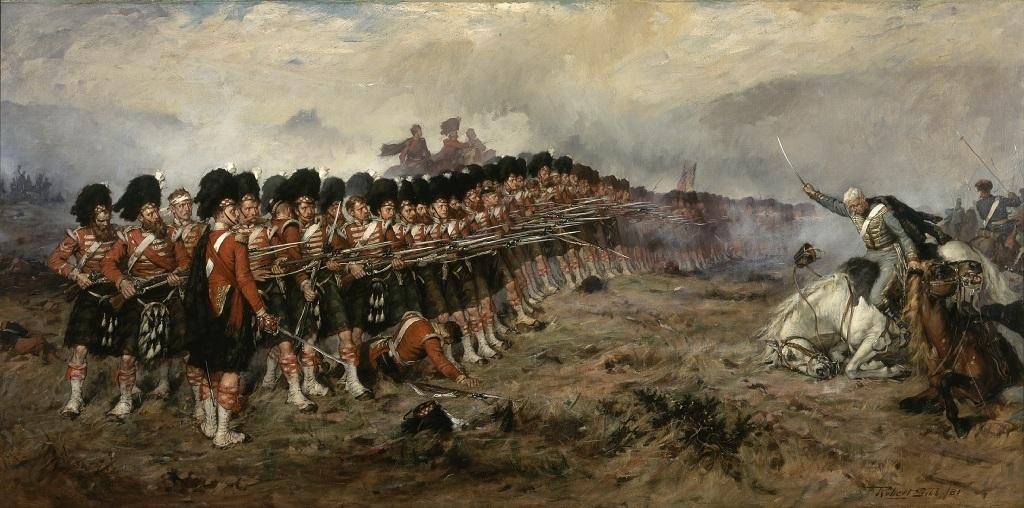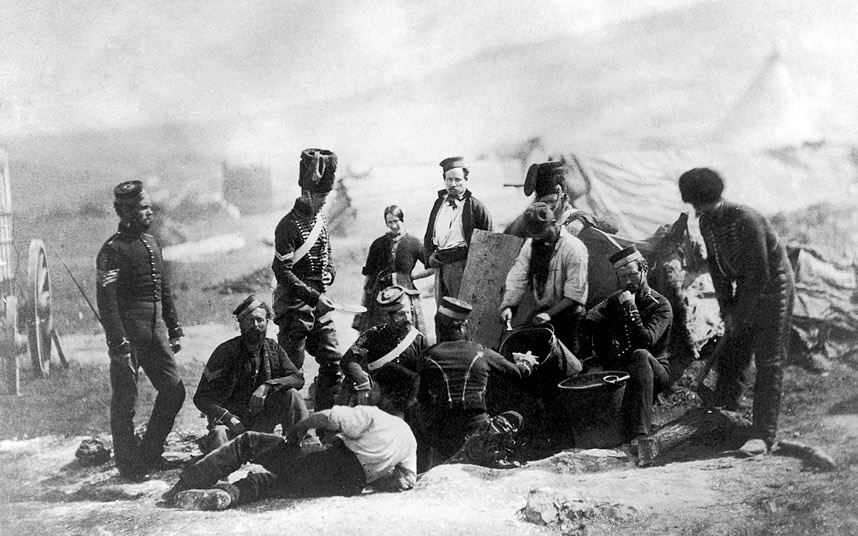
The confrontation between Russia and the West have always ended in a collective for the first sad
So it was during the cold war, so it was a century earlier, when the Russians lost the Crimean War — the most bloody conflict of the 19th century
September 24, 1927 years in London were buried 93‑letnego Charles Èllingvorta. The funeral took place with honors at the big crowds, as many knew about a dead: Èllingvort was the last living participant in the battle with the Russians under Balaclava in 1854 during the Crimean War.
Large-scale European conflict, living memory of which was Èllingvort, lasted from 1853 to 1856 and was the forerunner of the year of the first world: Britain, France, Sardinian Kingdom (part of modern Italy) and the Ottoman Empire (Turkey) on multiple theaters, ranging from white to the Black Sea and from Bessarabia to Kamchatka-fought against the Russian Empire. The main battle took place in Crimea. As a result, Russia lost, due to its position in the Black Sea region permanently weakened.
For Britons that war has become a matter of national pride, leaving numerous traces not only in the form of monuments to her heroes, but in the culture of the Crimean battles, for example, went steady expression of the thin red line.

The French, allies of the British, no less proud of his Crimean successes. Even the main thoroughfare of Paris they gave the name of Sebastopol Boulevard in honor of the victory of the French troops at the siege of that city.
The war generally gave the world a lot. The first samples of propaganda, active use of the Telegraph, military photo and basic journalism, casts, cigarettes, regular weather forecasts, the first Sisters of mercy — all appeared during the Crimean campaign.
The Russians also have not forgotten about the Crimean War. The main efforts of writers and historians in subsequent years, 160 were aimed at persuading the fellow: losing Russia it is just an excuse to take Sevastopol city of Russian military glory.
The illusion of power
Even at the beginning of the war among the Russian nobility went poem anonymous author in German, dedicated to the then Russian Emperor Nikolai I: "thou, from whom no death does not dispute the title of the greatest man, which only saw the land. Conceited Frenchman proud Brit lean before you, blazing envy — the whole world lies in worshipping at your feet ".
King really was so cocky that ignored even the stinging comments their Ministers about the backwardness of the country.
When in the year 1837 allowed the first locomotive from St. Petersburg to the attractions and restaurants in Tsarskoe Selo, Finance Minister Yegor Kankrin said: "in Europe railways connect industrial centers, and we — are in the pub".
Present a technical wonders for Russian merchants and officials was the first world's fair, held in the year 1851 in London. Russia brought on her 400 exhibits. Nearly all agricultural products, textiles, bladed weapons. The British showed a prototype of a fax machine and instrument capable of predicting the weather.

Inspired by shows the fruits of the industrial revolution, the Russians returned to their homeland, where understood such reach here impossible. The emperor was not interested in technology: Nicholas I took endless military shows. Gloss ceremonial uniforms and brass bands have created the illusion of a strong army. No one was thinking about the technological backwardness of this brilliant armies. Rifling is a key innovation of the time — in the Russian army was barely represented six rifles per company. And it was the rifles will be one of the main obstacles to the ambitions of Nicholas i. Slug coalition soldiers were flying at 350 m, Russians — to 120 m.
While appetites King grew up. Even under Catherine II, i.e. approximately poluvekom earlier, Russia went to the Crimea and Northern Black Sea coast. Now Nikolay I demanded protectorate over the entire Christian population of the Ottoman Empire and even control of the Turkish Straits of Bosporus and the Dardanelles. This is not liked in the first place not even Turkey itself, as its ally — Britain. But the Russians have managed to anger and even Paris, who many centuries feuded with London. In early 1853 year diplomatic conflict broke out due to the keys to the Christian churches in Jerusalem and Bethlehem, stationed in the Ottoman Empire. The French have made to the Turks gave up control of them Catholics. Russia demanded the same privileges to the Orthodox.
Many historians agree that Russia until the Crimean War, and already has sufficient privileges on the Black Sea. Russian ships calmly walked into the Mediterranean through the Turkish Straits, and Orthodox pilgrims visited the Holy land without problems. The basic premise of war served as it is the ambition of Nicholas I to become King of the Conqueror, which would have the exclusive right to influence the Orthodox world.

Corresponding haughty rhetoric of Russian diplomacy was the fuel that sparked the fire.
In the year 1851 in France as a result of the coup Napoleon III came to power. King reacted with anger, so as to address the Congress of Vienna House of Bonaparte could not occupy the French throne. Nikolay welcome letter addressed to Napoleon "my dear friend". Whereas in such cases recourse was made "my dear brother". And Paris is considered an insult.
Frank bestaktnost′û look and Russian plans under section of the Ottoman Empire. At the beginning of 1853‑go Nikolay I met with British Envoy Lord Seymour and conveyed the offer of his Government to: take Egypt and Cyprus, and the Russians occupy almost all the Balkans. While in London thought over this, Russian Ambassador Alexander Menshikov in Istanbul announced the proposal as requiring Sultan Abdul-Mejid. Followed the refusal and the severance of diplomatic relations between Turkey and Russia. And 3 October 1853 year countries have declared war on each other. It did not take long for and England with France: in September of the following year their troops landed under the Evpatoria.
The thin red line
Crimea became the main arena battles, the epicenter of which was in the port area-the fortress of Sevastopol.
Landed on the peninsula, the allies attempted to immediately take the city, but in October, under the 1854 Balaclava met the desperate resistance of the Russians.
In the early morning hours of 25 October 1854 year Ural Cossacks Regiment went on the attack on the 93‑j Scottish Regiment. General Colin Campbell built his highlanders in two rows instead adopted the Charter of four because the front in this place was too broad. The first rays of the Sun covered the Redcoats of the Scots. Campbell appealed to his soldiers: "the order to sail will not, guys. You must die where stand ".
Usually on a battlefield infantry had little chance against cavalry. But in this case deployed on all fronts the Scots managed to deter an attack, and the Ural Cossack regiment after the battle 10‑časovogo had to retreat.
A Correspondent For The Times
William Russell has called in its report commissioned fellow a thin red line. British military journalists then used the Telegraph and their article left at home with incredible speed in those days — with a maximum delay of two days.
Russell's expression was picked up by his colleagues at home. Later, the painter Robert Gibb wrote the cloth of the thin red line, which is exhibited in Edinburgh Castle. (A) the name of the battlefield stuck in the national consciousness as a symbol of British fortitude and dedication.
On the same day another fight occurred near Balaklava — much less successful for the British — which is also reflected in English culture: the onset of the light Cavalry Brigade in the Russian guns.
Due to an erroneous interpretation of the order British Dragoons without training and reinforcements rushed into the attack reached the battery, slashed workers, but on the way back they literally swept enemy gun salvos.

Russell, in his report, described the end of the attack: "so, we watched as they broke into the battery; then, to his delight, we saw that they return, forcing his way through a column of Russian infantry, razmetav it like a haystack. And then their is lost, dispersed along the Valley — dare flank broadside batteries on the Hill ".
After these battles, the combined forces of Western countries had to begin a long siege of Sevastopol.
The poet Alfred Tennyson has devoted to this battle poem Attack light brigade. The same author wrote and Mowgli event — Rudyard Kipling — in his poem the last of the light brigade.
In the uk and in the 20th century have not forgotten this topic is about fine attack filmed two feature films, a British heavy metal band Iron Maiden recorded a song about it The Trooper (Trooper) based on Tennyson.
Kudos from loss
In Russian culture of the Crimean War no less devoted to painting. Suffice it to say that it was with her, or rather with the Sevastopol stories, began the ascent of Leo Tolstoy, a participant in those events.
But the heroism of the soldiers and sailors of the Empire in the Crimean War was a little justified — Russia lost.
For Nicholas I this was a personal tragedy. Contemporaries believed that he fell ill and died shortly afterwards, at the beginning of the 1855‑go, one year before the end of the war, simply because of its disastrous results realized.
Defeat was a foregone conclusion — the Russian military machine, which the Emperor saw through parades, was actually an archaic and administered by stupid generals and mzdoimcami.
At the beginning of the war in the high light of the eruption of several corruption scandals. The loudest was associated with invalid Fund. Its leader Alexander Politkovskij try to Pocket from the coffers of more than 1 million rubles. With this money he arranged luxury balls, where there were many Royal Ministers.
Supply of the Russian army was very bad. Railroad in Crimea will conduct only in 1870‑h. Food got a ride on rough dirt roads, and it is seldom fall to the front in full. A relatively honest supplier was considered is that Ukrainian manufacture Nikolay tereshchenko, who procured for Army bread and firewood. Besides local Tartar population more simpatizirovalo troops of the Coalition willingly providing them products.
11‑mesâčnaâ heroic defense of Sevastopol itself did not bring the Russians advantages — the city had to leave to get it back in Exchange for the captured in 1828 year Turkish Kars. Russian Navy burned during the siege of the city, and after losing the war of the Empire were allowed to be in the Black Sea just six patrol ships. In addition to these restrictions, the Russians were forbidden to build fortifications and in the Baltic Sea.
All the troubles contemporaries blamed King. Russian poet Fyodor Tyutchev wrote about Nikolai I: "in order to create such a hopeless situation, needed a monstrous stupidity of this unfortunate man who during his 30-year reign, being constantly on the most favorable terms, nothing took advantage and all missed, struggle with the tie's impossible circumstances."
Nevertheless, the glorification of the Crimean War in Russia began immediately after her graduation. With devastating results often ospivuvalysya. Poet Pyotr Grigoriev, a contemporary Museum, for example, left the following lines: "you've got four powers only rubble Yes piles of graves".
Graves was really much: the Russians lost in Crimea 256 thousand. soldiers, half of whom died of his wounds in hospital. However, the allies went to the war: returned home almost 100 thousand. French and 23 thousand. Brits.
Contemporaries were shocked by the scale of the losses. But after half a century, Europe once again faced a similar scale fighting, when the first world war. But the Russians, the British and French were already allies.
